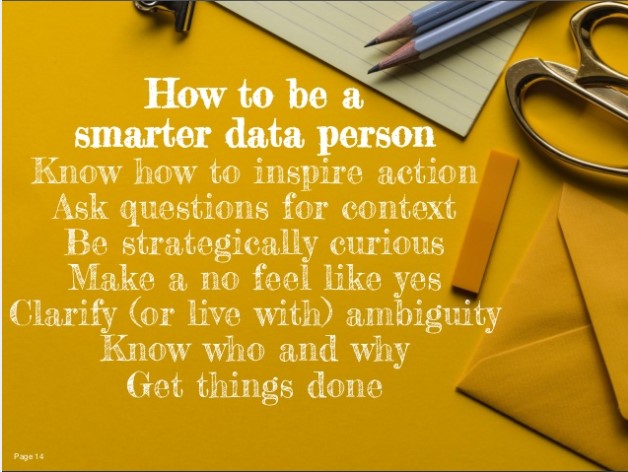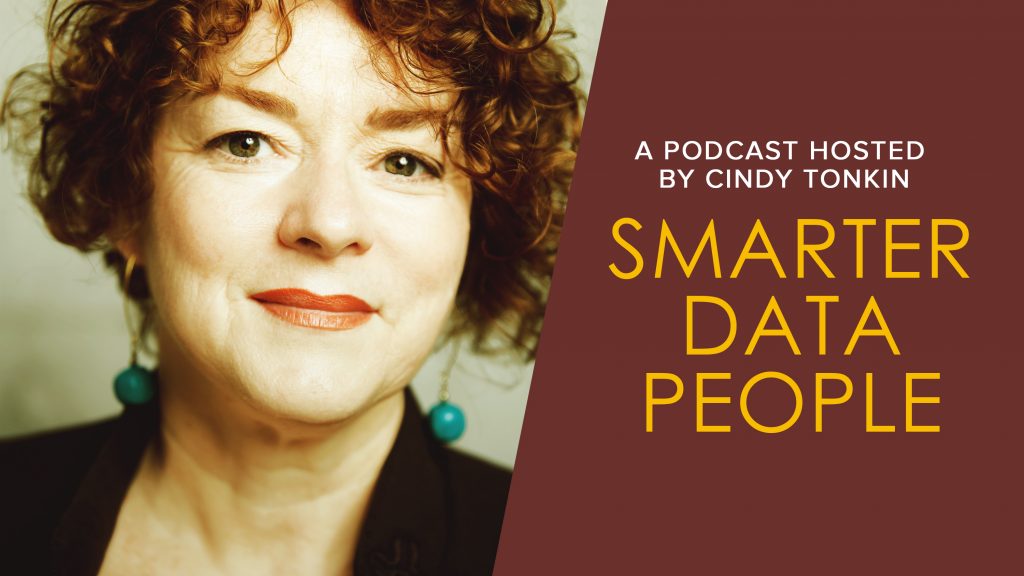
Mohammad Elteibi leads a small team who are playing with some lovely data.
He talks about how much he likes to learn to do something that he hasn’t done before. And some of these things:
- working with teams – need to have an outcome focus
- analytics for the sake of analytics – there’s no point
- building on top of other people’s work, not starting from scratch
- creating psychological safety (see my blog posts here)
- the power of food to build team
- working in a multi-cultural team
- analytics can be isolating: it’s not always a collaborative thing
- having KPIs that include having new ideas
- his path from food technologist to data analyst team leader
- why the worst data scientists are the ones who think they know everything: the best ones challenge themselves to do better, know context and to work with stakeholders
- his own learning projects, including building his own computer and media server
- why he prefers online conferences
- the importance of understanding a team’s frustrations
Recruitment strategies
Mohammad looks for these things when recruiting:
- technical ability is a given
- are you able to learn?
- what was the last thing you learnt?
- second round interviews are a project you need to undertake: it’s not just about can you do the analysis, but also how you think about the customer’s request
- can you think outside the box, can you work without asking questions every second
References
PCYC North Sydney is his favourite: here’s the charity challenge he got hit for!
Here’s Dan Ariely, psychologist, behavioural economist, researcher talking about how we value things we have made over things other have made (even when ours are not as good).
Conferences
Mohammad recommended these online resources:
- AI Machine Learning re: invent
- Short python newsletter
- KDnuggets on machine learning
- Dataone
- Some youtube playlists he recommends: Programming with Python, Django Tutorials, Automate the Boring Stuff with Python, Google Tech Talks, Siraj Raval on Machine Learning and such
Transcript of the episodeSummary Mohammad
The transcript features an interview with data science team leader Mohammad Elteibi, who discusses his approach to building and managing a high-performing analytics team. Key points include:
- Emphasizing team building and creating psychological safety through regular team outings and encouraging open communication
- Focusing on automation and making the team’s work scalable rather than manual work
- Recruiting based on problem-solving skills and ability to learn, not just technical expertise
- Importance of understanding the “why” behind the work and communicating goals clearly to both the team and stakeholders
- Staying hands-on with analytics work to maintain context and empathy for the team’s challenges
Transcript Mohammad Elteibi podcast, recorded in November 2018
Cindy Tonkin: So, ladies and gentlemen today I have with me Mohammad Elteibi who has been working in analytics for ages.
Mohammad Elteibi: Yes, very long time, long before it was cool to be in analytics.
Cindy Tonkin: Yes, exactly. Mohammad has recently become a lean mean fighting machine. Tell me about the boxing.
Mohammad Elteibi: Oh, the boxing is something I started about three years ago. Started it just for some fitness and some exercise, lose a bit of weight, but then in the last four months I decided to actually do a fight. Did it for charity. It was for charity, but you still get punched. The punches don’t hurt any less just because it’s charity. It was an awesome experience. Setting that challenge and actually stepping into the ring and fighting someone you’ve never even met before.
Cindy Tonkin: So how did you get into boxing?
Mohammad Elteibi: I’ve sort of been a fan of doing it. I don’t really watch much boxing at all. It’s something I’ve enjoyed doing a few times. I go to PCYC at North Sydney and the guys there are great. It’s not like the gyms where everyone’s got their headphones on and don’t talk to anyone. It is very much a community type feel. I like interacting with people. You get there, chat with them, and not just about boxing but about all kinds of stuff. You get to actually meet people, and the trainers are very good. They are actual fighters. The New South Wales women’s champion trains there. You would not want to get in the ring with her.
Mohammad Elteibi: It’s something that I set myself, and we started the charity challenge to raise some funds for the club. We had a goal of $3,000. I actually managed to raise about $7,000, which was really good.
Cindy Tonkin: Excellent. The PCYC does great work. They had a wonderful thing a few years ago I remember they were giving breakfast to kids because they found that kids came to school without breakfast.
Mohammad Elteibi: That’s right, and they actually have some projects for some special case kids as well. Especially with the youth. They work with them a lot. So, they work with the police with a special case kids who have problems. They’ll try and get them exercising, get them involved, make sure they go to school. So, it’s a really good program and they’re changing these kids’ lives forever really.
Cindy Tonkin: So obviously you keep your fitness up with boxing. How do you keep your brain active?
Mohammad Elteibi: For me it’s doing a lot of different things. There is obviously a lot of programming involved, but it’s not always about getting a data set, analysing a data set or building a model. Sometimes I would just do a bit web design. Like actually building a little website or there is a whole lot of things on visualizations and how you can make things like that.
Cindy Tonkin: So, you solve puzzles even in your spare time?
Mohammad Elteibi: So yes. I try not to be doing all the time, but when I have some spare time then I’ll crank up the laptop and just start typing on a few things.
Cindy Tonkin: Wow, have you got something that’s going to make you a million bucks one day?
Mohammad Elteibi: I don’t think so. Most of what I do is probably like small projects just to learn something that I haven’t done before. That really interests me a lot. Just doing something I haven’t done before, experimenting with it. There are a lot of websites and tutorials and all that kind of stuff. A lot of them seem to repeat the same thing over and over again. But for me when I see something that’s actually a bit different, it like “Oh, that would be interesting”. And especially in data science there’s a whole lot of things that are always coming up all the time. But just checking out a new framework to work with or try and do something bit differently or make it better or whatever it might be. Just experiment.
Cindy Tonkin: How do you get your team? What do you do with your team to make them have that same kind of discovery feel?
Mohammad Elteibi: So, the way I work with my team is pretty much I’m not a micromanager at all. When I’m working with the team, I explain to them what we’re trying to do, where we’re trying to get to, this is how we see this, what we’re going to use your analytics for. Because I think in analytics it’s very important to have that goal in mind. A lot of people go and build awesome stuff that nobody actually wants. So that’s just a waste of time for everyone.
Mohammad Elteibi: It’s true that not happens a lot. Doing analytics just for the sake of analytics doesn’t help anyone.
With the team, I always make sure that they understand what they’re working towards. Why are we doing building this model, why do we have to clean this data. It’s not always the fun stuff. Everybody loves the fun part about doing the prediction or making a segmentation. Everyone loves doing that bit, but no one wants to actually clean the data that we need to do that. But someone’s got to do it.
Mohammad Elteibi: I have a small team. It’s four of us altogether in the team. Our thing is automation. That’s how we can actually support the business because it’s such a small team. Our thing is if you build something once, we should not have to be running this ourselves. You build it so there’s a computer there to run it, not you. They understand the system, how it works, where their piece of the puzzle or the jigsaw is going to fit in. They know how all that works, and they have to. Because we’re building on top of each other’s work. We’re not building things that don’t relate to each other. For as such a small team, we don’t have time to be building things that don’t improve. And it’s all incremental steps.
Mohammad Elteibi: How do you build a team. how do you make that team feel like a team?
Mohammad Elteibi: Some of the things that I do, it’s not always just about the work. At least once a fortnight, I take them out for coffee as a team, all of us. Sometimes I’ll ask people from another team as well to come and join us. We just have a chat about anything; it’s not even work related. It’s just “get out of the office, let’s have a coffee, take that hour of our busy schedules to make the time have a chat”, and it can be about anything.
Our team is very multicultural. I’ve got a guy from Iran, from India and me. My background’s Palestinian. We have an Aussie person as well. So, it’s multicultural and we’re big foodies in the team as well. Food seems to come up all the time. About what people have cooked and dishes they have, all that kind of stuff always comes up. It’s really good to build that rapport with the team. I think that helps. That reflects in how they interact with each other during work, and then they chat and bounce ideas off each other.
The analytics sometimes when you’re doing the work can be quite isolating in a way. Because you just focus on doing this one thing, you don’t actually need a team to clean a data set. Sometimes you know what needs to be done and you just need someone to do it. It’s not always a collaborative thing. So having that, you can get stuck in just doing your own thing on your own, which I think is very bad for an analytics person.
Cindy Tonkin: Yes. There’s a need to actually have connection to people at some point. It doesn’t have to be living in each other pockets. Just an hour a week where you get to know your team. One of the things that consistently comes back, but when I do work on asking questions, for example for analysts. The things that people come back and say is, I don’t understand my client’s context. I don’t know what my client cares about. It’s not just is this going to be green, but what food do they like and kids and all those things. And what you’re doing is a masterful stroke in making that easier to do. There’s a lot of work in management literature at the moment around psychological safety. Making it safe for me to say I’ve got a problem, or safe to say I’ve got an idea. Part of it is just having that sense of rapport. Do I trust this person? I know that they’re not going to hurt me because I had coffee with them.
Mohammad Elteibi: Exactly right. That’s one of the things that I always say to my team. If you have an issue with something, if I’m doing something that’s annoying you, just tell me. Just because I am the team manager that does not mean I don’t make mistakes. I’m still learning just as much as you are. We’re all learning new technologies. Experimenting, and learning new things is a big thing for us.
Actually, I make it part of their KPIs to have new ideas. We’re a data science team. It’s not just about everyone telling us what we want. What do we want to do? How do we want to contribute to the bottom line of this business? It’s up to us to come up with ideas. We are the ones that are in the data every day.
Cindy Tonkin: So, you’ve been with this team now a couple of years. Have you had to recruit yet? And how do you recruit? .
Mohammad Elteibi: I’ve recruited two people. Here’s what I’ll look for.
For me the technical ability needs to be there. You need to know SQL, if you don’t then don’t even talk to me. The other thing that I look for is your ability to learn. Can you actually learn something new? I ask that question every single time. What was the last thing you learned. How did you learn it? When I do the first round it is usually asking them that type of questions. On the second round should you make it through, you get to do a project. My project that I give them is very simple. Get a piece of data. I don’t care what it is you choose; you choose what analysis you want to do. All I want to see is what you did and how you did it.
Cindy Tonkin: Ok, so it’s “show me your work”.
Mohammad Elteibi: Exactly right.
- How did you get this answer?
- What type of technique did you use?
- What data did you choose?
And it’s really funny. Every time I do this, I get various types of people. I can get some that say I’ve got a data set somewhere I’ll just use that. Something I did 10 years ago; I’ll just present that again. Others will be like; Can I just get any data? Whatever you want. Is this one good? If you think it’s good, it’s good. I’m not going to give you any answers to anything. It Is completely up to you. I’m actually looking for not just the fact that you can do the analysis, but how do you actually make that decision? Why did you choose this data set? Why did you choose this type of approach for your analysis?
Cindy Tonkin: So, you ask the why after each one of those? So, people say something like “I had this data I worked on 10 years ago”, or “I thought about what you wanted to see”. Do they do mind reading?
Mohammad Elteibi: Yes. Some of them you can see that they actually thought about what company I’m in and what industry were in, and they go looking for what they think is what I want to see. It showed their thinking, and whether they can think about the customer, which in this case is me.
It showed their thinking, and whether they can think about the customer, which in this case is me.
Mohammad Elteibi: I’ve had people telling me that their potential new job actually sent them their own data that they wanted something done on and said here, do this for me. How terrible is that?
Cindy Tonkin: No, that’s terrible. So, are you in the process of recruiting now?
Mohammad Elteibi: Well, I just recruited, they had a new person join the team a couple of months ago. So that’s the process. Currently in this role I’ve recruited three people and that’s the process I go through every single time. I’ve had this process for years now.
Cindy Tonkin: So just to be clear, what people did you choose?
they can’t ask me every single second like, should I do this? Should I do that? I want to see your input. I’m not here to give you instructions and you follow them. I want you to think about this. I’m telling you what we want at the end.
Mohammad Elteibi: So, the people I choose need to be able to think outside the box. That’s probably the most important thing for me. They can be a linear thinker, and they can’t ask me every single second like, should I do this? Should I do that? I want to see your input. I’m not here to give you instructions and you follow them. I want you to think about this. I’m telling you what we want at the end. Like here’s the data, here’s the problem. I’ll give an example of something we worked on recently.
Real life story. We work in the entertainment industry with Ticketek, they sell tickets to all kinds of different events. We wanted to create a new classification for events. is this a concert, is this a sporting event? If it is a sporting event, for example, what kinds of sport is it? Is it boxing, is it football? Is NRL, is AFL? Was there an international team? Sometimes they get teams like Manchester United coming over. We had Brazil come over and play a game, I think in Melbourne not long ago. So that’s an important fact about this event, bringing different people with different audience going to attend, bigger crowds, so there’s a lot of implications. So that was something we needed to actually build. How we’re going to classify? Ticketek has been around for years, so we need to classify all these events.
That was a big job for us to actually create these classifications and decide what are we going to call the different events. In classifying them, you can say concert. Well, what’s a concert? If you’re attending something at the Enmore Theatre would that be classified as a concert? Is that Theatre? It’s quite tricky. That is something that we’ve actually got up and running now.
But I didn’t want someone stopping and saying, oh, should I call this a concert? I don’t know. Why are you asking me? I don’t even know what this thing is. There are people who know these events inside out, ask them or ask Google. Because they can look up the events and you can get information about what it is. Because we need to start with a clean set of things we definitely know are concerts. We need to define this thing before you can even do any predictions or anything. Just arriving at that data set in itself was a challenge.
Our brief was to create this classification. This is what it needs to do. Every time there’s a new event coming up for sale, we want to classify it automatically store it, be able to identify for example if it’s a concert, who is the artist, give us some information about this artist. If its sport, who is the team, is it a regular season, is it the finals, part of the final series and so on.
Cindy Tonkin: So, a whole series of triage questions. Talk to me about lessons you’ve learned. Youve been an analyst for how long?
Mohammad Elteibi: I ‘ve been working in analytics now since 2004. Maybe even earlier. My undergrad study was in food technology. I started in food technology, and I worked with Goodman Fielder in their R & D department.
I used to work on Meadow Lea spreads, and all the White Wings cake mixes and things like that. Lots of cake! As part of the work that we used to do a lot of sensory testing. They would invite people to come and taste test, and they give it scores like how sweet they think it is and all those types of things about it.
As part of that I started to work with market research company called Colmar Brunton. Just by coincidence I was talking with one of the guys from there. I was at the time also studying statistics. It was always a subject I found really interesting, and I moved into market research. That was my first job in market research. As part of doing a lot of taste testing, I started analysing the data from all the taste testing in the market research that was really interesting.
Cindy Tonkin: Yes. That’s an interesting path. So, when we first met you were working in a bank.
Mohammad Elteibi: Yes. I was working at the bank. From market research I started working in financial services. Did a few financial services institutions. I think the fact that I started with such a big organization, going from dealing with data in spreadsheets. I remember in market research always having the discussion of sample size. We need a thousand people. That’s way too much, can I get around it with 500? Then going into Bank, there’s millions of millions of rows of data and then you get all the people’s transactions.
Oh, my god, let’s just throw away a few million of them. That was a big shift in how you actually approach problems because you can’t just do whatever you want with such a big data set. You have to actually think about how you’re going to do it. A lot more than just get an excel spreadsheet into SPSS and off you go.
Cindy Tonkin: And yet it is a good foundation.
Mohammad Elteibi: Absolutely. Working there gave me a much better appreciation for the complexities of analytics, by dealing with data that is so massive. This was before there was Hadoop or Spark or anything like that. We were talking relational databases here. You had to write your queries to extract your data to start with. Then when you extract it, you had to find a way to actually do something with it, which was not the easiest thing in the world to do. Having to actually plan out how you’re going to do it, will it even fit in the computer? There was no cloud. You had to find a way to make it work.
Cindy Tonkin: So, what was the biggest lesson you’ve learned as a leader? Cause that’s trickier than data.
Mohammad Elteibi: I think it’s probably explaining the goal. Why. I find the why, not just for my team, but also for my clients. Like analytics. People sometimes are their worst enemy in that they say things like I’m doing this fantastic convoluted neural network as if everyone knows what that means.
They’re just trying to find a way to get you clients who are going to buy stuff. They need to say that, and stakeholder will say “Yeah. Awesome. Go ahead. Yes, that’s what I want. Give me 10 of those”.
Cindy Tonkin: You didn’t already know to do that? What taught you that?
Mohammad Elteibi: I learnt that fairly early on in the Bank too because you are working with very different people. You know the fact that you working with teams and some people are marketing, some people are product, some people are IT and they all come at the same problem from different angles, but we’re actually interacting with all of them because we need to work with IT. We need to work with marketing. We need to work with product. We need to meet with everyone to bring them on this journey and at the same time we are selling them something they haven’t used before. We are telling them that we can help you do their jobs effectively better, which quite frankly no one really wants to be told that.
Right. What do you mean? What do you mean I can do it better? I’m doing an awesome job. Like, look how much sales we’ve had and look at this, look at that again, that’s great, but you can still get what you’re doing. Make it just that bit better. You’ll get your KPIs, and you’ll get your bonus and you’ll be happy.
Cindy Tonkin: What makes for a better or worse data analyst or scientist?
Mohammad Elteibi: Kind of the total worth. We’ve sort of touched on it, but the worst ones are the ones who think they know everything. So, if you think you know everything, then you clearly don’t know anything. Cause the more you know about analytics and the more you realise you don’t know. I’ve always been a believer in that. Not just for analytics, for all kinds of stuff. That’s a principle of mine. No one knows everything. Especially, yes, especially me.
Mohammad Elteibi: More than happy to always learn what the best ones are. The ones I think who challenge themselves and think about problems, not just the technical part, but the interaction, how this going to be used, this model or whatever it is are, are built. How can I actually work in the environment with all these other teams? How can they actually build them at the best model in the world if it can’t be used? What’s the point? It’s not, it’s not a good context.
Having that context and being able to work with stakeholders I think is probably a very big task for now is technically a lot of analysts I’ve worked with who are technically brilliant, but when they actually come to interacting with stakeholders or clients, they somehow lose their focus? And they don’t understand that you’re actually doing some work for them to use. You’re not the one using your model.
Cindy Tonkin: Yeah. Yeah. They need to know what you’re doing. In the context right now where you’re building a model that will continue to generate answers right? You never touch it again and you might come back to revise it, but you never go there.
Mohammad Elteibi: If it’s a one-off build that’s right. It will be there, and it’ll classify all these events. And there may be events where it’ll say, oops, sorry, I thought this was boxing, but it turned out to be MMA or turned out to be wrestling or something, right. It’s not the end of the world. That’s something that you need to be prepared to answer, why does something like that happen or what can you do about it and how can we improve it?
Cindy Tonkin: There’s a big deal right now with the thing that you have to be able to explain the data. In Banking you have to explain the algorithms behind the data. Does that manifest in your industry?
Mohammad Elteibi: For us, probably not so much because it’s not as regulated or anything like Financial Services. For us, and a lot of the things that we do, like that classification is really an internal thing. And for us, we then use that classification to understand our customers.
Cindy Tonkin: So, you’re using it more for segmentation, rather than for acquisition and a bit of targeting of marketing, right?
Mohammad Elteibi: Yeah. It’s not making a decision. The client can’t go to concert because “Your application for a concert is refused?
Cindy Tonkin: I’m sure there’s an exclusive event somewhere is like if you’re not on the list you don’t get it.
Mohammad Elteibi: I’d imagine those will be invitation only. Not that I’ve ever received an invitation. I think we should ask… is there a special secret place?
Cindy Tonkin: So how do you learn. Do you listen to podcasts, do you read?
Mohammad Elteibi: I do a lot of futurist videos and stuff. Futurist videos, YouTube video, YouTube videos. A lot of YouTube videos they tend to show hack stuff. A lot of the things of the technical stuff so you can actually follow the code and see what they’re doing. I get lost in a chain sometimes. I do. I tend to look for topics that I’m interested in, I’m very erratic that way. “Oh, this sounds interesting, oh, how do you make a website using this particular thing? Let’s have a look”. Very easy.
Mohammad Elteibi: And the fact that the YouTube videos keep on playing one after the other. Oh, where was that video that I saw that I thought was interesting. Now I have to go back and find it.
It’s very hard to listen to a podcast because they tend to be more technical stuff and I take it in through seeing the screen, seeing what they’re doing on the screen, how their programming and what approach they’re taking to do this particular thing. I’ve been watching recently at lot of things about processing pictures and computer vision and things like that. And that I find that really interesting. Like I sometimes pick up these ideas that I think, oh, be cool to make something like put a little camera on my door so that when I walk in it will say “Hello”.
Mohammad Elteibi: I’ll probably never get around to doing it. I’m sure I could probably buy this already, but it’s not as much fun.
You can take a photo and says you’re looking at blah blah blah. Theoretically it’s not a new technology at all. But for me, I’ll, I would want to do it. The joy is actually me doing it.
It’s like, yes, I’m building my own bed. Yes. No, that’s right. And then whenever someone comes over to my house and see it that’s a story, I can tell them about how I built it.
Cindy Tonkin: There’s research about when we make stuff versus buying it. There’s more pleasure in it. And we value it more. If a pro makes an origami animal and I make an origami animal, I’ll pay this much for the pro’s version, but I’ll pay as much for my own version. Because I built it, it’s special. Even if it is technically not as good.
Mohammad Elteibi: Yes. I built it. I’ve put in the effort and emotionally invested in this.
Cindy Tonkin: Even apparently if they give you a book or something, and they want to buy it back, you want to charge them more because you’ve owned it. Even if only for 10 minutes. It’s suddenly worth more.
Mohammad Elteibi: Even my own computer. I built my own computer. It was a little Christmas holiday break that I wasn’t going anywhere. I just bought all the components. It’s a desktop tower. It’s my media server at home. I’ve got all my movies and stuff on it. I can watch on my TV. Now I have a media server you never have to look a watch anything that I don’t want to watch ever.
I do attend conferences. A lot of conferences especially online. And the good things of the online ones that you can literally watch the ones that you like selectively. You don’t need to leave. And if you don’t like it, you can simply close the browser. And watch something else.
Because we use a lot of AWS and Google cloud, I’ve been following a lot of those conferences. AWS always have conferences. They have ReInvent, which is their big one. But they also have like conferences that are fairly specific to particular topics. They have been talking a lot about AI, machine learning, all that kind of stuff recently. So, learning about what AWS offers has been something that I’ve been listening to recently. Google cloud the same. There seems to be somehow a conspiracy, and AI is now the thing now. So, they are all going hard on AI and promoting AI and how they AI is better than the other ones.
Mohammad Elteibi: Yes. I’ll get all the emails and newsletters and get I’ll get a lot of tips. Emails with tips about programming and there’s a Python one.
It’s just fairly short, succinct. Here’s one thing that you can make your life that tiny bit easier.
Mohammad Elteibi: I don’t want newsletters that go on and on and on about stuff. There’s a KD nuggets that I get which doesn’t have a whole newsletter, but it’ll have links to particular things. I’ll get the O’Reilly data one as well. So that tends to have things specific to O’Reilly and what they’ve got and tends to be from really trusted sources. I also get a Google and all the big tech companies creating articles and stuff that you can listen to or read. So those are the ones that I tend to follow
Cindy Tonkin Is there anything else that that’s important you think in terms of leading data scientists and being a world class data scientist?
Mohammad Elteibi: One of the things that I think is that just because you’re leading the team doesn’t mean you don’t have to do analytics itself. That’s one of the things that I have always felt that I need to be hands-on. If I had a bigger team than it’d be probably a time constraint. But since I have the time, I like to be a bit hands-on to be able to actually understand their frustrations as well. When you’re work with the data you know some of the problems that your team is facing.
We’ll then start a project to solve our own problems sometimes, you know, just say, well how can we do this better? Like having like summary data that you can then just use to build your model. That would be awesome. So tomorrow, why not just do that? Making our own lives easier as well as everybody else’s.





